This month, long-time supporter and American Friends of The School of St Jude (AFSJ) President, Laurel, returned to the school for the Form 6 Graduation. On her eighth visit, we caught up with her to find out what keeps bringing her back.
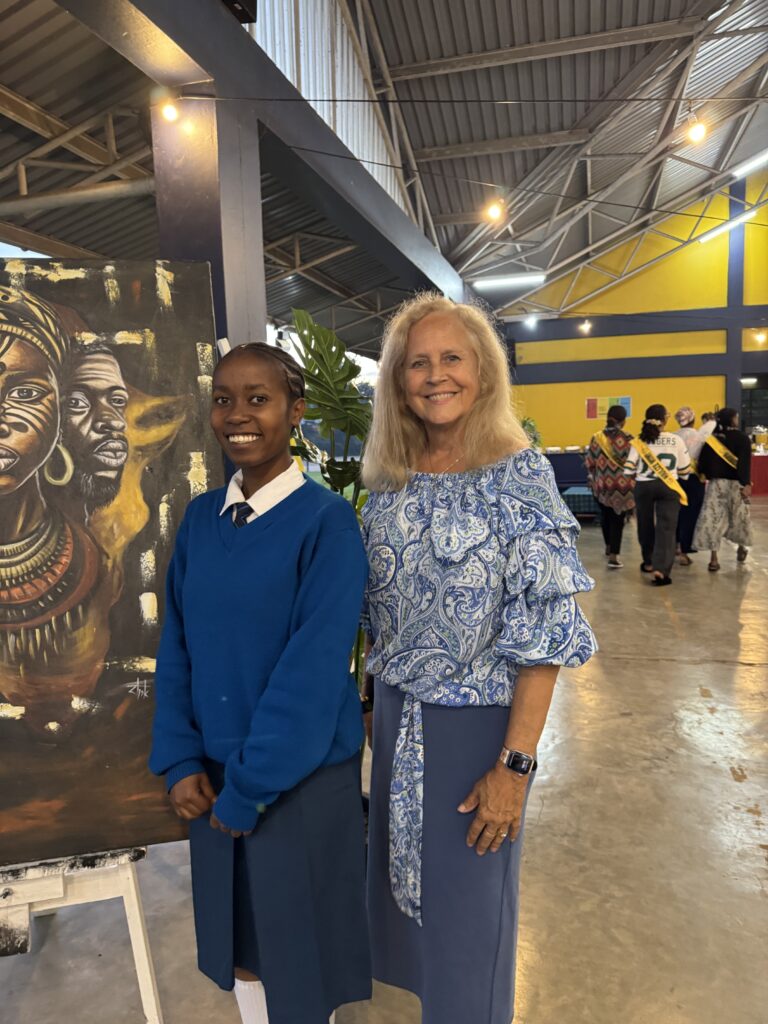
I was president of my Rotary Club then, and I was intrigued after hearing a talk about The School of St Jude. We decided it would be our international project. We initially tried sending parcels with supplies, but then decided it would be better to visit the school ourselves. While a Rotary grant wasn't possible, we started meeting students and my club began sponsoring Beatrice, who graduated this year. So even though she's not listed as a student I sponsor, I financially support her through the club.
Watching them blossom and grow and work towards their dreams has been phenomenal. Take Abdullah, for example. When I first saw him in 2021, his artwork was done on graph paper, and he told me his real dream was to work in animation. With the help of the Art Program and other school staff, he created a portfolio, and eventually, we found a university in South Africa for him to study animation. It's incredibly exciting to see him pursuing his passion. I have students who have gone all the way through to Form 6 and are now in tertiary education. I also have ones who are at the beginning of their journey like Jafari, who's in Form 3.
I think the most exciting thing is that they're all given an equal opportunity at St Jude’s, yet they're all so different. Being able to sponsor multiple students, you see that they're allowed to become their own person. But the common factor is all of those values that are instilled in them at The School of St Jude; the idea that someone has helped you, now you get to help someone else. Watching them apply that through their own strengths is incredibly rewarding. Whether it's Elia potentially becoming a sportsman, Abdallah in his art element, Happiness wanting to be a bank manager or Samwel aspiring to be a doctor - the school equips them all to do different things, and that's what's most exciting.
Initially, I didn't know a lot about the school beyond what I'd read and heard. But because this is my eighth visit, I've gotten to watch the students grow up and evolve. I've also become involved on another level with the board of the American Friends of The School of St Jude, doing fundraising and tours. This has made me feel really comfortable and passionate about the school, making it easy for me to share what's happening here with different groups in the United States. My comfort level has grown to the point where I can now facilitate things like a FaceTime call for a friend's sponsored student to connect with them during graduation.
You can't describe it. No matter what you try to tell them or what a picture looks like, it's not the same. When they come, they will be forever changed and they'll understand firsthand what the work of the school is. Until they're here, they really don't understand. Once they experience it, they can't help but want to sponsor and support a student, whether it's a partial or full sponsorship. I also reassure them about coming to Tanzania, the school will take care of them, they won't be on their own, and communication isn't an issue. The culture here, where people genuinely take care of each other and share, is something truly remarkable that you only fully grasp by being here.
Every year, hundreds of new students enrol at St Jude's on full scholarships at the primary, lower- and upper-secondary levels across our three campuses. The scholarship application process is competitive and involves academic testing that considers the financial and social situation at home. Our Community Relations team oversees this entire process, with the help of the whole St Jude’s community. The team also handles student health and welfare, parent portfolio, and home visits.
"The students that attend St Jude's are from families who could not have otherwise afforded private school education," explains Philip, Community Relations Manager at St Jude's. "Providing free, quality education goes a long way in ensuring that children from such families have a future in which they thrive, effectively breaking the cycle of poverty."
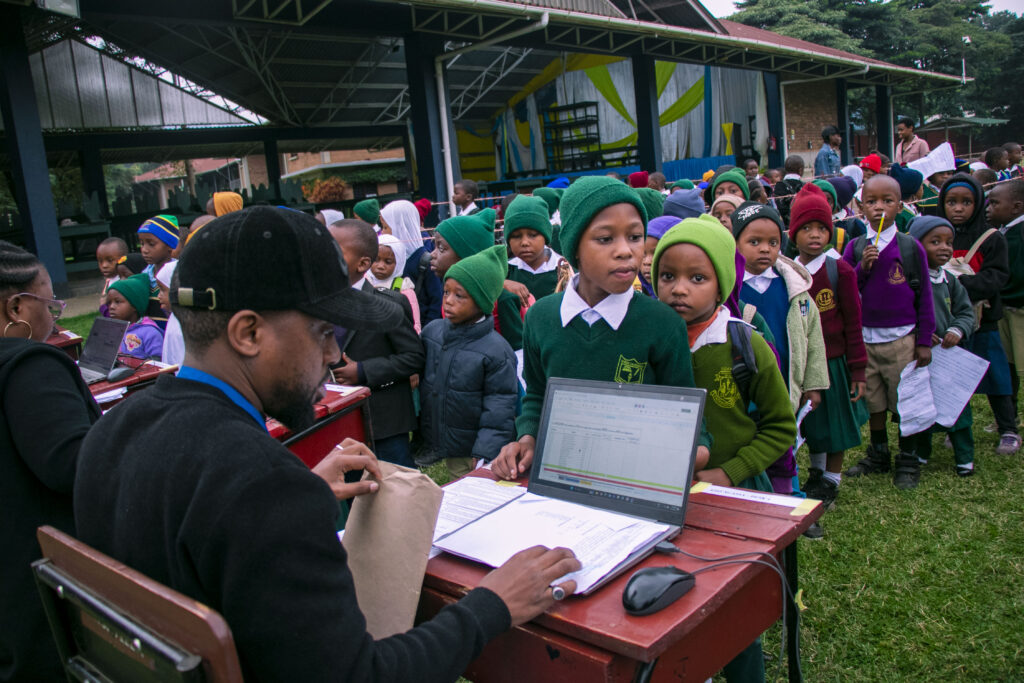
While free, quality education is a proven path out of poverty for our students' families, other challenges could prevent students from achieving their goals. According to St Jude's poverty assessment data, most, if not all, of our students' families do not have health insurance and never go for regular health check-ups. It is common for household members to visit a health centre or hospital only when they fall seriously ill or when home remedies fail. This lack of preventive care increases the risk of undiagnosed health complications that may go unnoticed for extended periods.
"That's why at St Jude's, we conduct annual health checks for all students, including newly enrolled and continuing students. A team of international and local medical professionals and volunteers spend two weeks at the school performing comprehensive health assessments. These checks provide recommendations that help us better understand our students' health needs and tailor our support systems accordingly," says Philip.
One significant intervention made possible by the health checks involved a student, Fatuma, a recent graduate of St Jude's Girls' Secondary School. During her initial health check, the medical team detected a hearing problem that her family had been unaware of. The St Jude's Health and Welfare team collaborated with her family to address the issue, allowing Fatuma to continue her studies freely.
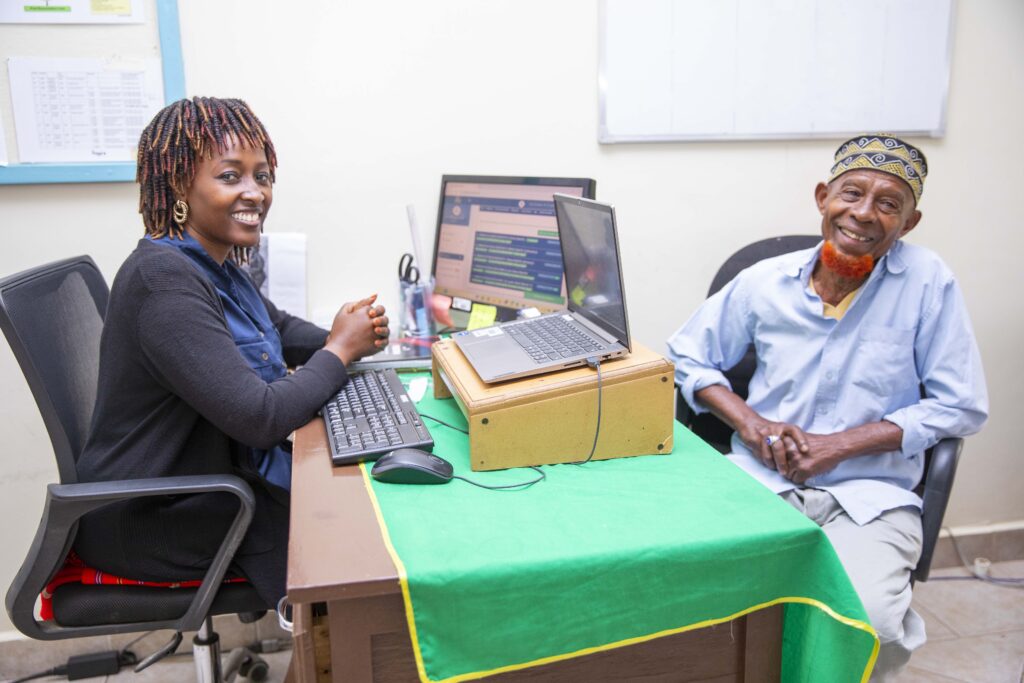
"Without the health checks, it's unlikely that we would have detected the problem and addressed it in time," reflects Fatuma's father, Abubakari, a single parent of three children. "Since my family does not have health insurance and never go for regular check-ups, these assessments were the only means for me to know what was wrong with my daughter and seek medical help."
Annually since 2010, St Jude's has been conducting health checks for its students. The program has evolved based on feedback from the school, the Health Check team, and knowledge of available health services in the region. With a shared understanding that healthy students learn more effectively, these health checks focus on identifying health and wellbeing issues that could impact students' ability to learn individually and collectively.
The Health Check team provides specific advice to parents regarding their children and general recommendations to the school based on observed health trends.
"As a school, we take proactive steps to support students who need special attention," says Gloria, Health and Welfare Officer at St Jude's. "These measures include dietary adjustments, regular sessions with the school counsellor, and other personalized interventions. My team works closely with parents to ensure students remain in peak health and that any health concerns are addressed promptly."
Beyond dedicated health and welfare programs, the school promotes positive student well-being through nutritious meals, physical education, extracurricular activities, a full-time school counsellor, and structured rest periods. A St Jude's scholarship goes beyond tuition and academic support—it ensures the success of future Tanzanian leaders through a truly holistic approach that prioritises education and well-being.
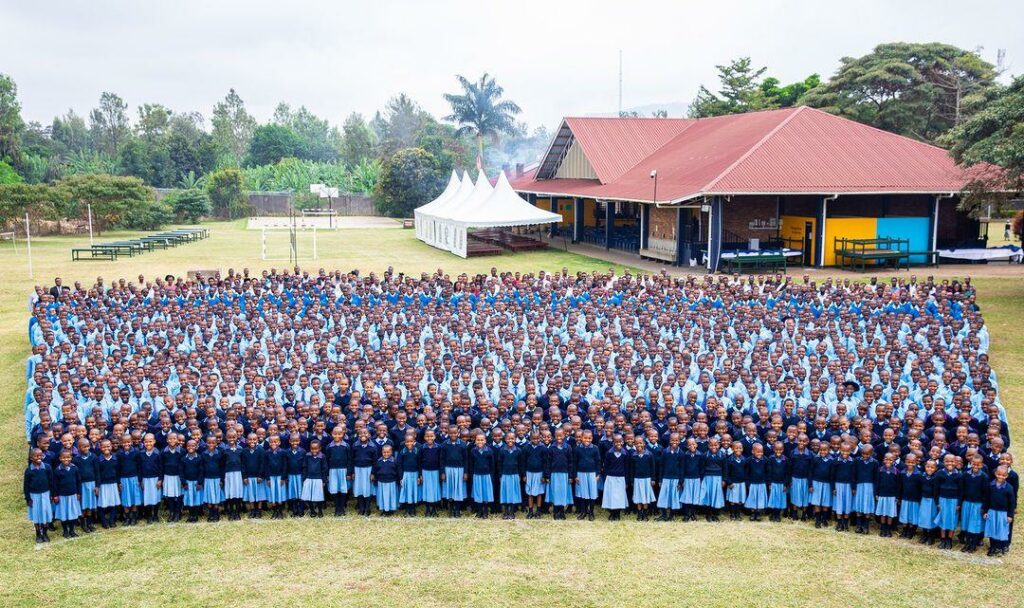
| In 2002 | In 2025 |
| Three students | 1,800 primary and secondary school students on full scholarships and 360 scholars being supported in higher education. |
| One volunteer teacher | 101 teachers, all Tanzanians. 300+ staff altogether, 98% local. |
| One campus | Three campuses. Boarding accommodation for all secondary students. |
| One classroom | 101 classrooms in addition to 12 IT labs, 3 dining halls, 11 science labs, over 30 sports fields and halls, an art gallery and much more. |
| A big dream to bring the opportunity of free, quality education to children living in poverty. | Living the dream. Hundreds of graduates return to their communities as leading professionals, entrepreneurs, and transformational leaders. |
Scholarship Application Process and Welcoming New Students
We are excited to welcome new students to St Jude’s in 2024 following an extensive scholarship application process. It’s no small feat!
Alumni
Beyond St Jude’s (BSJ) is bigger and better than ever! With growing placements in our Community Service Year (CSY) Program and increasing opportunities for international scholarships, 2023 was a huge success for the BSJ team and scholars.
Infrastructure and Development
And didn’t stop there! We also did a lot of work on campus to ensure the best facilities for our students including…
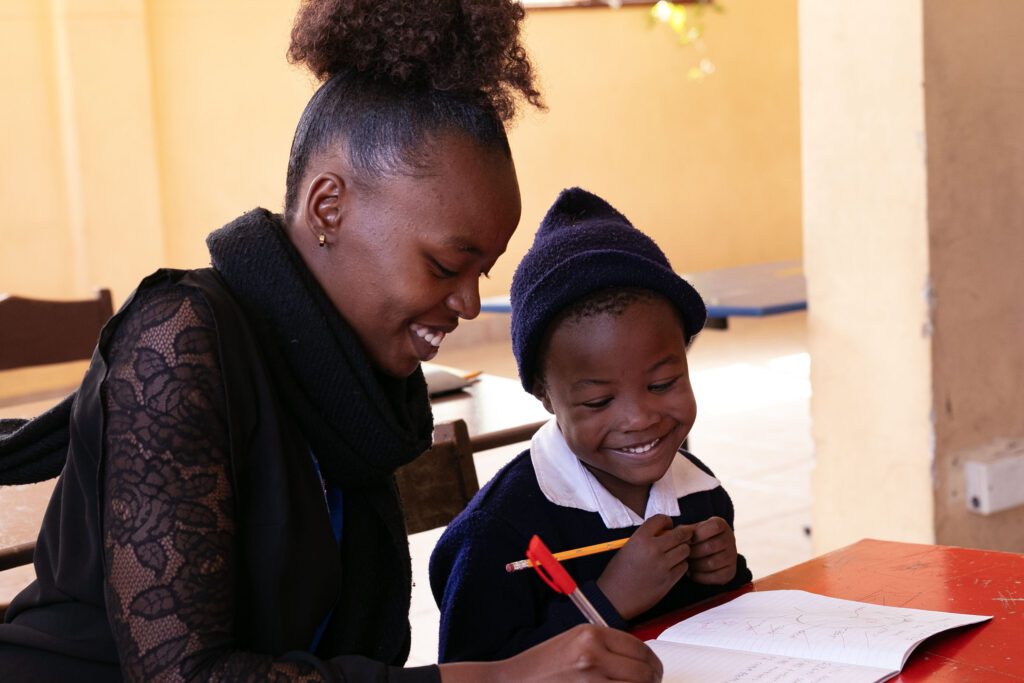
Every year, over 3,000 high-achieving students from government schools apply for a scholarship at The School of St Jude. The scholarship process is rigorous to ensure that our limited spaces are fairly awarded to students are on a transparent and consistent basis.
Allocating scholarships is a delicate balancing act as we want to ensure those in the most need received fair opportunity. Each applicant must pass through three phases including the Scholarship Application Day, Poverty Assessments and the probation period.
These stages are carefully designed, providing plenty of aspects to explore. Today we will take a deeper dive into the third stage – the probation period. This part of the process spans a two-week period where potential students enter a St Jude’s classroom to be closely assessed by St Jude’s Primary School’s academic and leadership teams.
Academic assessments
After each week of St Jude’s classes with our primary teachers, students participate in assessment on three subjects; arithmetic, health and environment and English language. These tests help St Jude’s to select students who outperform their peers and demonstrate a high level of academic promise.
Behavioural assessments
Two teachers are selected to observe and record the student’s behaviour, discipline and attitude during these two weeks at school. This assessment contributes to the decision-making as we look for students who demonstrate the school values of Respect, Honesty, Kindness and Responsibility.
Further poverty assessments
After Probation classes are complete, successful students and their families undergo further poverty assessments, which are conducted by our Community Relations team and Parents Committee. A student is finally offered a scholarship on the one of the most special days of the St Jude’s Calendar, Uniform Day!
21 years ago, on 29 January 2002, The School of St Jude welcomed its very first class.
On that first day, there were just three students, taught by a single volunteer teacher, Angela Bailey.
Within weeks the school had grown, so that by 2003 there were 120 students.
Over the years, more students were granted scholarships, more land was purchased, more classrooms built, boarding houses opened and a second school started, then a third. Students graduated from primary school, then secondary and started university with the support of St Jude’s.
From humble beginnings, St Jude’s grew and grew, with the support of an international community of supporters. Today, St Jude’s educates 1,800 students, employs over 300 staff and supports more than 300 scholars at college and university.
In all the excitement and nerves of that first day in 2002, who could have predicted what St Jude’s would achieve by 2023?